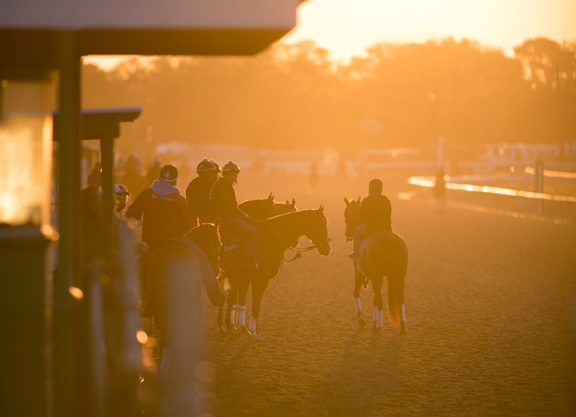By T. D. Thornton
The Louisiana State Racing Commission (LSRC) voted Thursday to impose an emergency order on the state's racetracks and training facilities that guarantees horses and horsemen can “shelter in place” for the next 30 days without threat of eviction.
The coronavirus-related order, which comes on the eve of the GII Louisiana Derby at Fair Grounds, will not affect Saturday's spectator-free running of the most prominent racing card in the state.
The order also does not mandate that horses and horsemen have to shelter in place–it just guarantees that those who want to stay will be able to do so for the next month.
Recognizing that COVID-19 orders and regulations at all levels of government are changing almost daily, the LSRC left open the option that it could come back and revise the order.
The impetus for the emergency meeting was a notice sent out by Evangeline Downs on Mar. 16 that initially told horsemen to vacate the premises by Mar. 18. That 48-hour-notice eviction did not happen though, because Boyd Gaming (which operates the track) and horsemen came to a temporary agreement.
The subsequent LSRC order, which was read in summation from a 31-page document at the beginning of the one-hour meeting, mandates that all licensed racetracks and training facilities in the state of Louisiana shall now:
1). Allow horsemen and their horses to shelter in place without threat of eviction.
2). Allow access to tracks and exercise facilities at least every other day for the well-being of the horses.
3). Allow horses and horsemen to continue in accordance with their training schedules, regardless of whether or not a race meet is being conducted.
4). Implement the National Thoroughbred Racing Association's recommendations for response to COVID-19.
Commissioners emphasized several times during the public commentary period that the order is intended to allow for shipping flexibility at a time of the season when Louisiana's horse population–both Thoroughbreds and Quarter Horses–is traditionally in flux from racetrack to racetrack.
Fair Grounds closes its Thoroughbred meet Mar. 29 and, according to testimony from a track spokesperson, management there wants to slice the horse population from 1,450 to 650 in the interest of making for a less dense backstretch environment.
While a number of national Thoroughbred outfits might ship out of Louisiana altogether, state-based stables would normally be making plans to head to Evangeline (which has already pushed back its Apr. 8 season opening) or to Louisiana Downs, which is slated to start racing May 2.
At the same time, the Quarter Horses are shifting from Louisiana Downs to Delta Downs, which is also operated by Boyd Gaming.
But like Fair Grounds, Boyd executives testified that they too are concerned about taking on too many horses because of concerns that crowded conditions related to backstretch workers will spread COVID-19.
“If we move 600 or 700 horses into one of our tracks, we're simply going to pack them in there and have exactly the same problems as Fair Grounds is experiencing,” said Vincent Schwartz, Boyd's senior vice president of operations. “We've got staffing issues too, and it would be irresponsible for us to put our employees in that situation.”
Schwartz said he thought he had come to a “gentlemen's agreement” on Monday night with Bernard Chatters, the president of the Louisiana Horsemen's Benevolent and Protective Association, that would have quelled the threat of eviction. That plan, he explained, called for Boyd to remove its employees and hire a contracted security staff, plus garbage and manure removers, to keep the backstretch safe and clean. The racetrack would not be open for training, however.
“That was kind of the solution to the horses having nowhere to go,” Schwartz continued. “And now this has morphed into 'Let me fill up the place,' and then 'Let me have the training facilities as well.' So we [would now] have to bring in a truckload of employees that have to be exposed to all of these [horse] workers on the backside.”
Chatters told the LSRC that his organization's proposal was for training on Mondays, Wednesdays, Fridays and Saturdays from 7 to 10 a.m. with no break, and an official clocker being on site only on Saturdays to time official workouts.
Yet the vote on the order was taken, and the meeting was then adjourned, without that specific sticking point about staffing for training being resolved.
When a Boyd spokeswoman specifically asked for clarification from a representative from the state attorney general's office if the order required racetracks to maintain staff to accommodate training, the AG's representative replied that the order is simply “directing to allow access.” Staffing, he said, “would require further negotiations between any tracks and horsemen.”
Hundreds of listening-in members of the public shared the same open conference-call lines as the commissioners and industry stakeholders. Because many callers were unwilling or unable to figure out how to mute their phones, a lot of the testimony came across as garbled, making the identification of speakers difficult.
Not a subscriber? Click here to sign up for the daily PDF or alerts.






